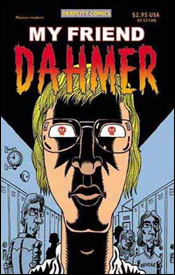 My Friend Dahmer
My Friend Dahmer
Writer: Derf
Artist: Derf
By Michael David Sims
Mass murderers and serial killers — we like to think they're monsters, freaks of nature created by a childhood bump on the head, bad genetics, or some random fluke. Never do we think of them as lonely children starving for friendship. They're isolated from the world around them, growing even more cold and distant from their peers as hormones take over and the teenage years set in. It's kinda like looking at our parents' yearbook photographs. Even though we can clearly see that they were once young, we can't accept it. We shake our heads, grunting, "Uh-uh!" We don't want to believe it because, by nature, we can't accept the truth. In this case, the truth being that we might have been able to prevent these monsters from ever becoming — but societal rules, overworked teachers, our own hormones, troubles and lives put an early kibosh on that.
Case in point, John Backderf. At the tender age of 12 Derf befriended another young lad by the name of Jeffrey Dahmer. Yes — the very same Jeffrey Dahmer that would later rape, maim, kill and ingest numerous young men. Derf was there. He witnessed firsthand the downward spiral that created the man we call monster. And, through his skills as a cartoonist, we too witness it in Derf's autobiographical comic My Friend Dahmer.
As Derf says in his intro:
"It's a painful story for me to tell. Believe it or not, I consider Dahmer a tragic figure. But remember... my memories of him are of the tormented kid spiraling into madness, not the monster who later committed those horrific crimes. I remember him as bullied and shunned, much as I was. A quiet young boy who devolved helplessly into a twisted soul."
Truth be told, Dahmer is rather painful to read, because we've all been there. At some point in our lives we've met (or been) the kid that everyone looked sideways at because they didn't fit in, no matter how hard they tried — often resulting in more cockeyed glances and tormenting. It's painful because, now as an adult, I look back and think about all the kids I tormented — not that there were a lot, but enough to make me disappointed in myself. And I wonder/worry how my actions might have changed them for the worse. Did I scar someone so horribly that they'll one day suck the life from another person's heart? This is what I ponder now, but back then, when my actions seemed funny, I thought nothing of it. And I'm willing to bet neither did you.
In Dahmer's case, before anyone knew the true horror that bubbled over in his head, Derf saw the warning signs. You know, the flashing red lights that scream, "Something's not right!" But he was a teenager — what was he do to? If the adults that were being paid to monitor them weren't doing anything, then who was he to speak up? Besides, we all recall the Number One rule of the playground: You don't rat out a friend — ever!
Back then, maybe that was the mentality, but today, in this post-Columbine world, we've become extra sensitive to the kids that constantly ditch class, show up drunk, mimicking those suffering from cerebral palsy (or any ailment), dress in black, brood, write bleak poetry and prose, play first-person shooters in their dank basements, listen to anything but those oh-so-catchy and overly annoying pop songs, and/or do anything outside the norm.
Now in no way, shape or form am I knocking vigilance. What's merely being pointed out is that anyone with a differing opinion, look or attitude from the rest of the flock is being watched with unwavering, suspicious eyes throughout the four years of high school.
Columbine taught us the exact opposite of what it should have. We should have learned to celebrate the individual, and realized that differences don't make others fodder for ribbing. Instead, what we seem to have taken away is ultra-fear of those who aren't constantly smiling and giggling like idiots.
Jeffrey, like an untold number of teenagers, was dying to fit in, but what did he get for his troubles? Ignored by the teachers, abandoned by his parents, and taunted by his peers. Ultimately, isn't this exactly what happened to Eric Harris and Dylan Klebold?
We've been left with two possibilities in the wake of their madness:
01. Let the oftentimes vicious cycle of high school taunting continue — which will lead to the creation of other Dahmers and Columbines. Or...
02. We become hyper-vigilant, squashing everything that is unique about us as individuals — which A. will never happen, and B. will in no way prevent future crimes.
Either way, before we know it, another serial killer or mass murderer will emerge, and we'll ask, "Where were the warning signs? What could we have done to prevent this?" In the end, you need not look any further than your own childhood and My Friend Dahmer to find the answers.

